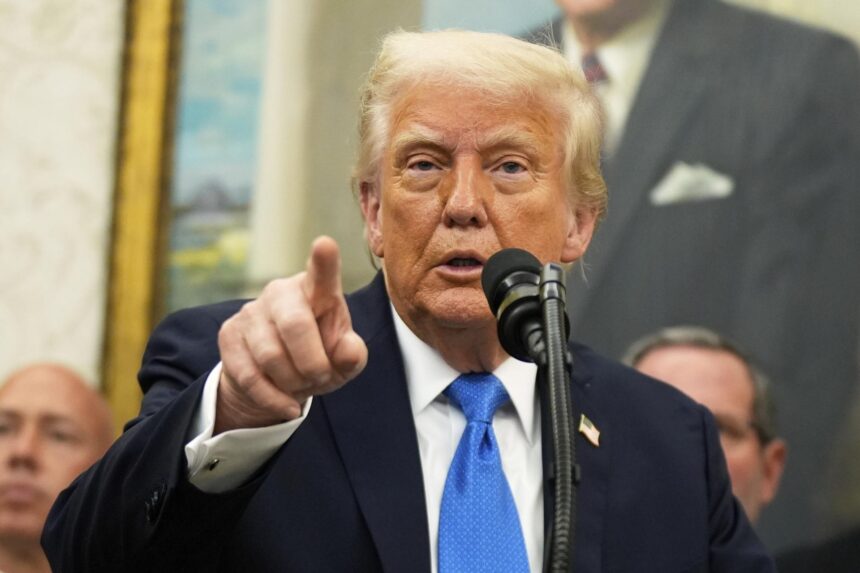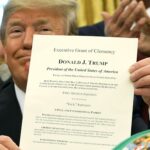Is Donald Trump Benefiting the World by Retreating from Global Engagement?
As the United States grapples with a complicated international environment, former President Donald Trump’s approach to foreign policy has ignited significant discussion: Does his emphasis on American interests and a more isolationist stance pave the way for a fairer global order, or does it signify a withdrawal into nationalistic seclusion? With an unwavering commitment to “America First,” Trump’s administration questioned established international partnerships and treaties, prompting essential inquiries about the consequences of such a pivot. Advocates contend that by scaling back U.S. involvement overseas, other nations are encouraged to take on greater responsibilities, potentially leading to a more balanced distribution of global power. Conversely, detractors caution that isolating the world’s foremost economy could trigger unforeseen repercussions, jeopardizing relationships built over many years. This article explores the effects of Trump’s isolationist policies on global diplomacy, security, and economic stability while assessing whether his strategy could act as a catalyst for meaningful change or if it ultimately undermines collaborative efforts in addressing common challenges.
The Global Economic Consequences of Isolationism
The shift towards an isolationist policy under Donald Trump has far-reaching implications that extend well beyond U.S. borders. Economies around the globe are increasingly feeling the strain from diminished American participation in trade and diplomatic relations. The consequences manifest in various forms:
- Trade Barriers: Imposed tariffs can provoke retaliatory actions from other countries, limiting market access and raising costs for consumers worldwide.
- Decline in Foreign Investment: Investors may become hesitant to engage with U.S. markets, adversely affecting stock exchanges and capital inflows into emerging economies.
- Supply Chain Disruptions: Nations dependent on American goods may encounter operational difficulties resulting in higher production expenses and delays.
A significant realignment of international alliances may also occur as countries strive to fill gaps left by reduced U.S. engagement. For example, nations might strengthen ties with rising powers like China or consolidate their positions within frameworks like the European Union—potentially altering global economic governance dynamics significantly.
| Nations Involved | Evolving Partnerships | Possible Outcomes |
|---|---|---|
| China | Bilateral Trade Expansion | Increased Global Authority |
| The European Union | Tighter Economic Collaboration | Divergence from U.S.-centric Policies |
The Impact of American Withdrawal on Global Alliances
The recent trend toward disengagement from international coalitions has sparked fervent discussions among analysts and policymakers alike. As America steps back from commitments that have characterized its post-World War II foreign policy framework, several critical outcomes are becoming evident. Countries previously reliant on U.S leadership are reevaluating their security strategies which could lead to shifts in global power structures; traditional allies such asand Japanare considering increasing military expenditures while exploring new partnerships due to America’s reduced involvement.
This rise in isolationist sentiment also opens doors for other influential players seeking greater prominence globally; nations likeand Russiamay feel emboldened enough to assert control over regions once dominated by America’s influence.
With multipolarity gaining traction we might observe substantial changes within existing governance frameworks where non-Western perspectives gain precedence.
Potential ramifications include:
- A surge in regional conflicts:If local disputes escalate without U.S mediation;
- A revival of authoritarian regimes:This shift may empower dictatorial governments;
- Difficulties within global trade networks:The emergence of new alliances complicates existing agreements;
- Ineffective climate action initiatives: strong>Nations feeling alienated might withdraw cooperation regarding pressing environmental issues; li>
Reassessing National Priorities for Comprehensive Foreign Policy Solutions
The current geopolitical landscape necessitates an extensive reassessment concerning national priorities particularly given former President Donald Trump’s assertive isolationism.
While supporters argue this approach emphasizes sovereignty & security critics highlight potential long-term impacts stemming from distancing itself away from vital alliances
A comprehensive foreign policy should adopt multifaceted strategies accounting not only domestic needs but also recognizing implications arising through active engagement internationally.
To achieve this balance policymakers ought focus upon these recommendations:
p>
- < strong > Fortify Alliances:< / strong > Strengthen traditional partnerships (e.g., NATO) creating unified fronts against shared challenges globally;< / li >
- < strong > Foster Diplomatic Relations:< / strong > Revitalize communication channels even with perceived adversaries encouraging dialogue reducing tensions;< / li >
- < strong > Enhance Trade Relationships:< / strong > Cultivate diverse economic connections enhancing both prosperity & security across borders;< / li >
- < strong > Champion International Initiatives:< / strong > Actively participate addressing climate change health crises humanitarian needs showcasing commitment towards collective welfare globally;< / li >
ul>th > th >
< tr > tr >td > td />
< tr /> tr />td /> td /> < tr /> tr />
td /> td /> < tr /> tr />
td /> td /> < tr /> tbody>
“Conclusion” h2>“In summary,” determining whether Donald Trump’s strategy toward isolating America ultimately benefits our world remains hotly contested territory.” While advocates claim this method allows reevaluation regarding alliances focusing inwardly upon domestic priorities critics warn about long-lasting repercussions stemming outwards affecting overall stability along cooperative efforts internationally.” As geopolitical landscapes continue evolving closely monitoring ramifications resulting due shifts under Trump’s administration becomes imperative moving forward.” The effects stemming forth will shape future diplomatic relations influencing broader dynamics across multiple fronts unprecedented ways only time shall reveal if such tactics serve greater good ushering forth uncertainty onto stage worldwide.”









